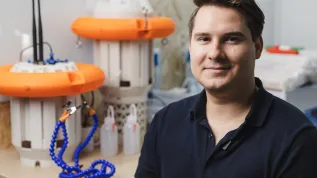
Innovative treatment method of pancreatic cancer using the NanoKnife device and administration of calcium ions or a chemotherapeutic has been launched at the University Clinical Hospital in Wrocław. Thanks to the grant, only in this institution about 70 patients will benefit from free therapy.
The hospital press office reports that a prestigious Medical Research Agency grant worth nearly PLN 9.5 million has been awarded to the Wroclaw Medical University in the 3rd round of the competition for R&D projects in the field of non-commercial clinical trials.
'Professor Wojciech Kielan's project concerns the impact of irreversible calcium electroporation, electrochemotherapy and electroporation (IRE-CACL2, ECT and IRE) on the quality of life and progression-free survival of patients with pancreatic cancer', we read in the release.
In addition to chemotherapy, NanoKnife electroporation used in the world for a decade is a chance to extend the life of patients with inoperable pancreatic cancer. The NanoKnife system generates a series of microsecond electric pulses that cause defects in cell membranes, which in turn causes loss of homeostasis and then the death of the cell. Electric pulses are applied in tissue using electrode needles. The treatment takes place under intraoperative ultrasound or transdermally.
'As a result of the use of the appropriate voltage, the tumour cells are irreversibly damaged and die. At the same time, blood vessels and nerves in the area of the cancer cells damaged by NanoKnife retain their lifetime, which often makes this method the only available therapy in places difficult to treat surgically', we read in the release.
The University Clinical Hospital purchased the NanoKnife system five years ago and since then the team from the General and Cancer Surgery Department carried out over 30 treatments with its use, achieving good results. However, the method is not reimbursed by the National Health Fund in Poland and its cost is huge.
'When applying for a Medical Research Agency grant, Wrocław researchers did not limit their application to electroporation, they went a step further. The starting point was the emergence of new medical technologies, using the formation of cancer cell membrane defects as a result of the NanoKnife procedure. These defects increase the permeability for medicines, which can thus effectively act directly on the tumour', the release reads.
One of these substances is calcium chloride, the effectiveness of which in the treatment of solid tumours has been confirmed by the research on cell lines, carried out by Professor Julita Kulbacka in the Cathedral and the Department of Molecular and Cellular Biology. Electroporation also allows to administer drugs used in chemotherapy. All these methods will be available to patients under the grant.
'In our study, we use electroporation, electrochemotherapy and calcium electroporation', says Dr. Julia Rudno-Rudzińska from the General and Cancer Surgery Department.
Patients with inoperable pancreatic cancer, after chemotherapy or during and without metastatic changes, may participate in the study. It is in their case that this therapy can be most beneficial. Wrocław scientists count on the involvement of chemotherapists from all over Poland to refer patients who meet the criteria for participation in the project.
'A grant from the Medical Research Agency for our team a distinction and recognition of many years of experience in the treatment of cancer. However, the most important thing is that in this project we expand the spectrum of possibilities of treating these patients, most of whom in Poland today are waiting for death', says Professor Wojciech Kelan, head of the General and Cancer Surgery Department of the Wroclaw Medical University.
In Poland, pancreatic tumors are detected in approx. 3 thousand people per year, and the number of patients increases every year. At the same time, pancreatic cancer belongs to cancers with the highest mortality, with only one in four patients surviving a year after the diagnosis.
'Such a high mortality is largely due to the fact that patients are referred to specialists in an advanced, often inoperable stage of the disease. It develops for a long time without any symptoms. Only some feel any symptoms in the initial stage when there is a greater chance for effective intervention. Surgical treatment is not always possible also for other reasons. The removal of the pancreatic tumour is complicated and the risk of complications is large. This is due to the location of this organ near the liver, duodenum and important blood vessels (portal vein, inferior vena cava and mesenteric vessels). There is a high risk of their damage. As a result, in nearly 80 percent patients we can only use palliative treatment', says Professor Wojciech Kelan.
Contact information for patients: e-mail: chirurgia.ogolna.onkologiczna@gmail.com. Consultations of specialists: every Tuesday at 12.00 - office of the General and Cancer Surgery Department of the Wroclaw Medical University, Borowska 213, phone: 71-734-35-00. (PAP)
Author: Roman Skiba
ros/ joz/ kap/
tr. RL













